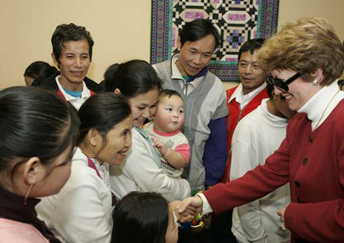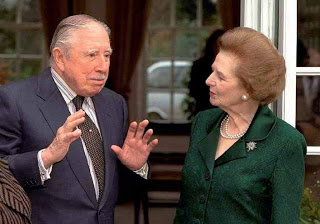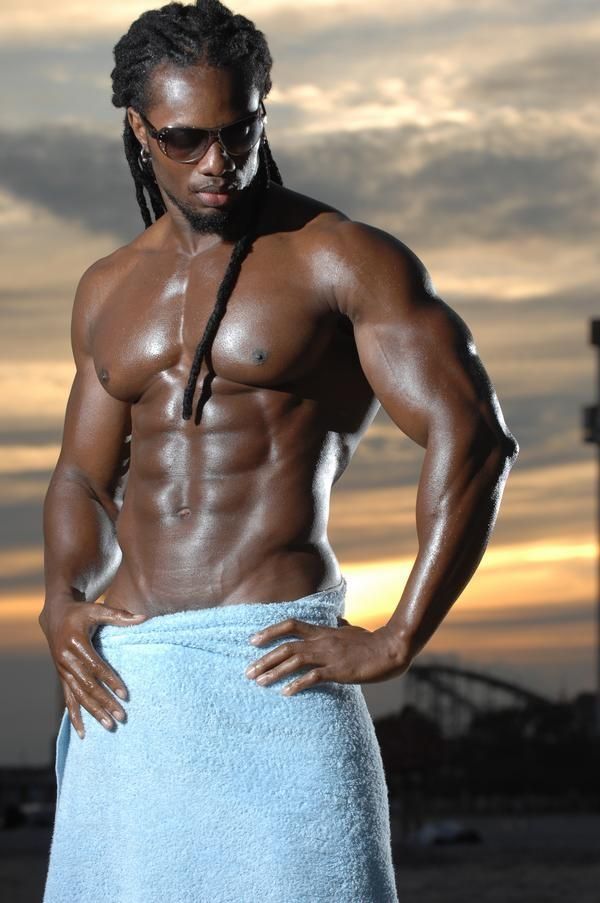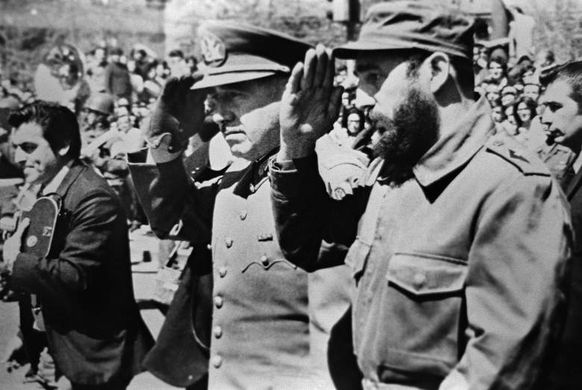Category Archives: AT - Blog 2007 - Page 4
Image of the month:
14940. [2] (Thomas Jefferson) Original Draft of the Declaration of Independence [article] 14941. [7] (Thomas Jefferson, et. al.) The Declaration of Independence [article]
I have not yet seen Gary Wills’ renowned study of the Declaration. But I did read Carl Becker’s work on the same subject when I was a kid. I have made a small reputation by trying to show the global origins of the democratic idea, as opposed to the connect-the-dots Greece-Rome-Britain-America sequence that is still a major component of the currently confused understanding of democracy. However, that doesn’t mean that I consider documents like the Declaration to be unimportant. Far from it. It was so important, in fact, that minor variations in its phrasing would have made a profound difference in the subsequent history, not only of the United States, but of the world. Because the Declaration was in the pocket, so to speak, of every American, it could have repercussions, and utility, far beyond any philosophical essay. Frederick Douglas, whose character and intellect make most of the more famous thinkers of the 19th century seem puny by comparison, wrote movingly of the impact its wording had on him. When you are a plantation slave, as Douglas was, the words “We hold these truths to be self-evident, that all men are created equal…” are not just a snappy slogan. They are hope, enlightenment, destiny, righteous anger, humanity, solace, and conciliation compounded in a single sentence. That sentence is important to anyone who wishes to free themself from slavery, and is a precious gem in humanity’s strongbox, not just for Americans.
So it’s interesting to compare Jefferson’s first draft with the final article. The first version follows the conventions of mid-eighteenth-century prose more closely. It is said that Thomas Paine had some influence on the revision, and it does shift to blunter, more Quakerish phrasing that would seem unusual in a cultured Virginian like Jefferson. But I think it more likely that Jefferson realized he was thinking in a new way, and that it had to be said in a new way. The first version is a product of a writer to be read in a book. The final version is a product of a man tapping a moral dimension of the universe. The sad thing is that Jefferson himself could not live up to his own inspiration. The man who did more than anyone except John Woolman to lay down the moral argument against slavery himself kept slaves. It is true that the Virginia legislature, fearful of his example, had declared that if Jefferson attempted to free his slaves, they would be seized and sold to other, doubtless crueler masters, but Jefferson, being an undoubted genius, could surely have devised some stratagem to circumvent this. No, it was just another sad case of a brilliant intellect capable of imagining, but not of doing what reason demands.
Friday, January 19, 2007 — Schools for Democracy
We have all complained about the lack of decent candidates to vote for, in elections. Yet nothing compels us to constantly elect sleazy and incompetent people to public office. Every community has talented, honourable, and uncorruptible people. It is the structure and customary operation of political parties that ensure that such people never enter politics.
So what is the solution for people who want to see reform and progress in their communities (whether local, regional, or national)? I think the solution is a school. What if there was a School of Democratic Public Service? It’s purpose would be to prepare people to run for public office. We expect someone who runs a hydro-electric plant to study civil engineering, we expect a carpenter to study carpentry. Why should we not expect anyone who presents themself as a candidate for political office to have studied it? This is not the same thing as studying “Political Science”. We would expect a serious candidate for public office to study philosophy, economics, management, environmental science, urbanology, history, sociology, law, human rights and moral philosophy, among other things, specifically as they relate to holding public office. If there was a school which offered a degree of Master of Democratic Public Service, and its courses where observably rigorous and progressive, I would certainly look on any independent candidate who held that degree with enough respect to consider voting for them. If any party went out of its way to select candidates who held such degrees, I would be inclined to take its platform seriously. I would be even more inclined to vote for someone who could demonstrate that they did not enter politics from business, or law practices that obviously incline them to bend to special interests or to seek financial gain through their office. Read more »
Monday, January 8, 2007 — Karen Refugees in Canada
 The CBC (Canadian Broadcasting Corporation) often does excellent international reportage, especially when they deploy correspondents like Patrick Brown. Tonight’s National News featured a good example. For decades, the dictatorship in Burma has been committing systematic mass murder while suppressing the seven-million strong Karen ethnic group, and using many they don’t kill for slave labour. Brown entered Burma (Myanmar) through the jungles of the Thai border with young Karen who are determined to document conditions in that region with handicams. Brown carefully gave a rundown of the historical background, introduced the main elements of Karen culture, and interviewed several people. Most dramatic was the interview with a frail, elderly woman forced to build roads for the Burmese army — roads which will be used to bring in troops to mine the region and burn down Karen villages. Read more »
The CBC (Canadian Broadcasting Corporation) often does excellent international reportage, especially when they deploy correspondents like Patrick Brown. Tonight’s National News featured a good example. For decades, the dictatorship in Burma has been committing systematic mass murder while suppressing the seven-million strong Karen ethnic group, and using many they don’t kill for slave labour. Brown entered Burma (Myanmar) through the jungles of the Thai border with young Karen who are determined to document conditions in that region with handicams. Brown carefully gave a rundown of the historical background, introduced the main elements of Karen culture, and interviewed several people. Most dramatic was the interview with a frail, elderly woman forced to build roads for the Burmese army — roads which will be used to bring in troops to mine the region and burn down Karen villages. Read more »
Sunday, January 7, 2007 — Who Will Undertake These Tasks?
As we enter the seventh year of a new millennium, the saddest thing to contemplate is not only the problems we face, but the pathetic inadequacy of the intellectual tools employed to address them. There has been, in effect, no progress in the way human social, political and economic issues are discussed. It is as if we were attempting to practice modern medicine, but incapable of employing any terminology except the prescientific concepts of “humours”, divine retribution, witchcraft and astrology. That is surely the state of affairs, for instance, when the idiotic “left/right” template is employed to describe “the political spectrum”, or when the childish pseudo-intellectual superstitions of Marxism and Conservatism still provide the frame of reference. These concepts were worthless when they emerged and petrified two centuries ago. That they remain dominant, unchanged, and inescapable in their putrescence, after all this time, suggests that our politicians, journalists, academics, and pundits are not capable of reasoning, learning, or growing up. Read more »
Sunday, December 10, 2006 — Another Cockroach Dead
Fidel Castro still lives, but there was some good news today. Another disgusting cockroach that has infested our world has died. No sane person will miss Augusto José Ramón Pinochet Ugarte, the ruthless dictator of Chile. The tragedy is, of course, that Pinochet was never brought to justice, never truly defeated by the forces of civilization and liberty. He was merely demoted, and some of his toys were taken from him. The countless thousands whom he tortured and murdered, the millions he exploited, have seen no justice. The same will be for Castro. Pinochet and Castro were, of course, identical twin brothers, duplicates of each other down to the smallest molecule. Both have gotten away with it. They have lived to ripe old ages, unrepentant and unpunished for their crimes.

Britain’s Margaret Thatcher chats amiably with dictator, mass murderer and torturer Augusto Pinochet, whom she seems to have deeply admired. At the time of this photo, Pinochet was under indictment for a tiny portion of his atrocities
¿Que diferencia tienen estos dos dictadores? — Nada.
Thursday, December 7, 2006 — Impressions of Stéphane Dion
I watched the Liberal Party’s national leadership convention with great interest, because the current Conservative government is rapidly losing the respect of the Canadian people, and the Liberals have a very good chance of winning the next election. The convention opened with Michael Ignatieff as the favourite, with a strong lead.
Ignatieff comes from an unusually prestigious background for a Canadian politician. His grandmother was Princess Natasha Mestchersky and his grandfather was Count Paul Ignatieff, a close advisor to Czar Nicholas II serving as his last Minister of Education. In 1918, Count Ignatieff was arrested and slated for execution but fled to Canada with his family after he was released by sympathetic guards. His father was a career diplomat who served as representative to NATO (1963–1966), Canadian Ambassador to the United Nations (1966–1969) and president of the United Nations Security Council. Read more »




